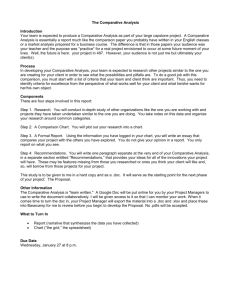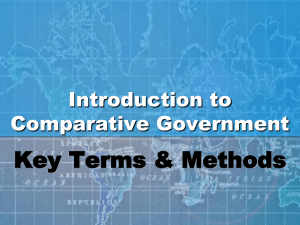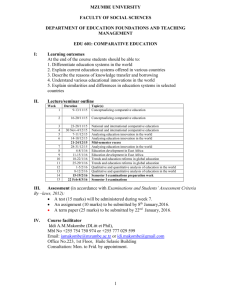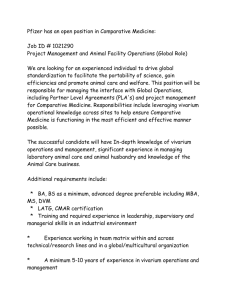EDU 578 - Kutztown University
advertisement
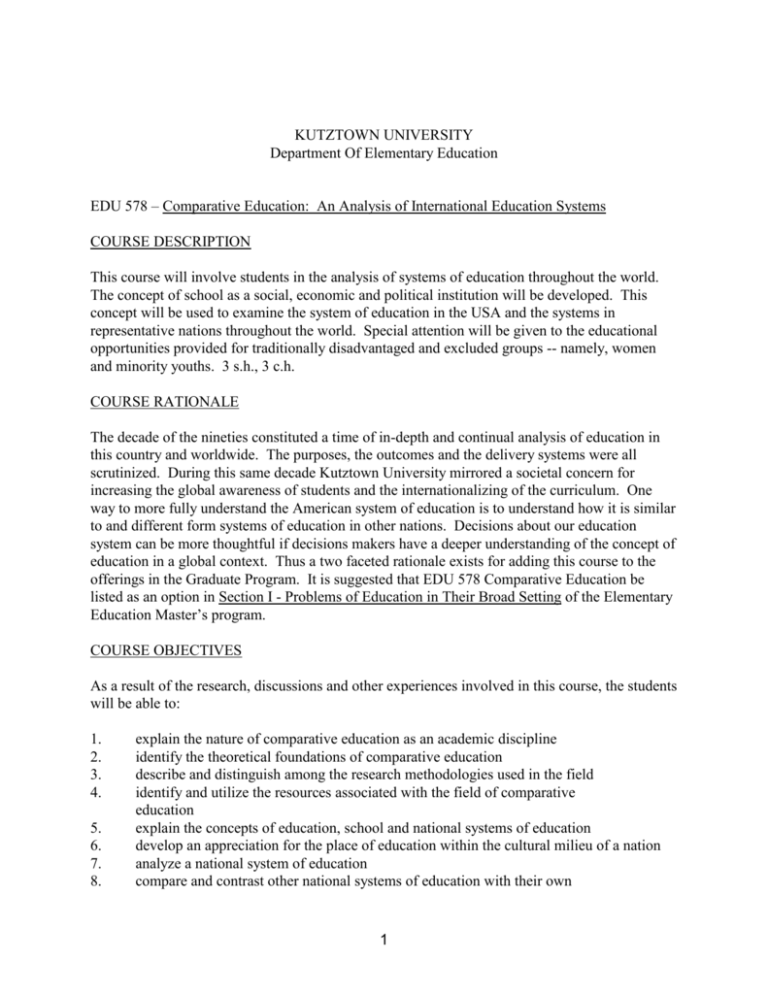
KUTZTOWN UNIVERSITY Department Of Elementary Education EDU 578 – Comparative Education: An Analysis of International Education Systems COURSE DESCRIPTION This course will involve students in the analysis of systems of education throughout the world. The concept of school as a social, economic and political institution will be developed. This concept will be used to examine the system of education in the USA and the systems in representative nations throughout the world. Special attention will be given to the educational opportunities provided for traditionally disadvantaged and excluded groups -- namely, women and minority youths. 3 s.h., 3 c.h. COURSE RATIONALE The decade of the nineties constituted a time of in-depth and continual analysis of education in this country and worldwide. The purposes, the outcomes and the delivery systems were all scrutinized. During this same decade Kutztown University mirrored a societal concern for increasing the global awareness of students and the internationalizing of the curriculum. One way to more fully understand the American system of education is to understand how it is similar to and different form systems of education in other nations. Decisions about our education system can be more thoughtful if decisions makers have a deeper understanding of the concept of education in a global context. Thus a two faceted rationale exists for adding this course to the offerings in the Graduate Program. It is suggested that EDU 578 Comparative Education be listed as an option in Section I - Problems of Education in Their Broad Setting of the Elementary Education Master’s program. COURSE OBJECTIVES As a result of the research, discussions and other experiences involved in this course, the students will be able to: 1. 2. 3. 4. 5. 6. 7. 8. explain the nature of comparative education as an academic discipline identify the theoretical foundations of comparative education describe and distinguish among the research methodologies used in the field identify and utilize the resources associated with the field of comparative education explain the concepts of education, school and national systems of education develop an appreciation for the place of education within the cultural milieu of a nation analyze a national system of education compare and contrast other national systems of education with their own 1 9. 10. conduct a cross national analysis of a current educational theme develop an appreciation for the nature of education and schooling in a global context ASSESSMENTS Assessments in this course will include but not be limited to quizzes and tests, projects, research article critiques, and interactive class presentations. COURSE OUTLINE I. Comparative Education, the discipline A. Introduction 1. definition 2. rationale 3. historic overview 4. international variations B. Theoretical framework 1. distinct discipline or interdisciplinary field 2. socio-economic-political foci 3. societal and academic forces that shape theory 4. conceptual distinctions a. education b. schooling c. training d. national systems of education C. Methods 1. educational tourism (i.e. travelers’ tales) 2. national comparisons (i.e. lending and borrowing) 3. historical/cultural studies 4. empirical studies (i.e. outcomes research) 5. ethnographic studies D. Resources 1. books 2. periodicals a. Comparative Education Review b. International Review of Education c. Comparative Education d. Compare e. Canadian and International Education f. Prospects (UNESCO) 3. organizations and agencies a. Comparative and International Education Society b. International Bureau of Education c. The World Bank d. United Nations Educational, Scientific and Cultural Organization 2 4. II. (UNESCO) e. Comparative Education Center, SUNY Buffalo Internet/World Wide Web Analysis of National Systems A. Cultural milieu 1. geography 2. population 3. society and traditions 4. history and politics 5. economy B. Goals of education 1. national 2. other levels 3. minority goals C. Structure of the school system(s) 1. academic year 2. types of schools a. public b. private c. parochial 3. organizational levels a. first level - pre-school, kindergarten and elementary b. second level - middle and secondary school c. third level - post secondary (1) community college (2) college (3) university d. other (1) special education (2) technical and vocational education (3) non-formal education (4) continuing or adult education D. Size of the educational effort 1. years of free public education 2. years mandatory 3. percentage of each age group in school a. public b. private c. parochial E. Administrative organization 1. centralized - nation system 2. de-centralized - local education units a. state, province or region b. county, prefecture or parish 3 F. G. H. I. J. c. municipality, district of local education authority Finance 1. source(s) of revenue 2. relationship of education expenditures to total budget 3. allocation of revenue to various educational levels 4. salaries of professional staff Curriculum 1. elementary schools 2. secondary schools 3. post secondary schools Evaluation of achievement 1. grading policies 2. promotion or progress assessment 3. system examinations 4. diplomas, certification and graduation Teacher education 1. type of institution 2. length of training required 3. differences between elementary and secondary teacher education 4. process of certification Major problem and reform movements III. Strategies for Selecting Representative National Systems to Analyze A. By Political affiliation 1. Democratic or capitalist nations 2. former communist bloc nations 3. non-aligned third world nations 4. fourth world people or indigenous tribal groups B. By geographic region 1. Africa 2. the Americas and the Caribbean 3. Asia 4. Australia, New Zealand and Oceania 5. Europe 6. Middle East IV. Current Themes Providing Topics for Cross System Analyses A. Equality of educational opportunity 1. by gender 2. by race, tribe or ethnicity 3. by economic class 4. by political affiliation 5. by handicapping condition B. Literacy C. In school variables 4 D. E. F. G. H. Role of the state in curriculum and textbooks Achievement outcomes Educational reform movements Economic development and education Need for schooling vs. vocational training 5 Instructional Resources Adams, B., &Trost, J. (2005). Handbook of World Families. CA: Sage Publications. Aikman, S. (2001). International Education and Literacy: An Ethnographic Study of Indigenous Knowledge and Learning in the Peruvian Amazon. Comparative Education, Vol. 37, No. 1., 135-136. Bray, M. (2003). Comparative Education: Continuing Traditions, New Challenges, and Paradigms. Netherlands: Kluwer Academic Publishers. Cave, P. (2001). Educational Reform in Japan in the 1990’s ‘Individuality’ and Other Uncertainties. Comparative Education, Vol. 37, No. 2, 173-191. Coicuad, J.M., Doyle, M., & Gardner, A. (2003). Globalization of Human Rights. Hong Kong : United Nations University. De Witt, H. (2002). Internationalization of Higher Education in the United States and Europe: A historical, comparative and conceptual analysis. CT: Greenwood Press. Dugan, S. (2001). Educational Reform in Viet Nam, Process of Change or Continuity? Comparative Education, Vol. 37, No. 2, 193-212. Elliot, M., Jealous, V., Witton, P., & Greenway, P. (2003). Indonesia, Seventh Edition. New York: Lonely Planet Publications. Espinoza, M. (2003). Issues in Latino Education: Race, School Culture, and the Politics of Academic Success. TX: Allyn & Bacon Gottlieb & Pearson (2001). GATS Impact on Education in Canada- Legal Opinion. www. esib.org/commodifications/documents/GATS-Impact.PDF. Handoussa, Heba (2003). Research for Development in the South: The Case of Middle East and North Africa. Canada: International Research Center. Holtzman, L. (2000). What Film, Television, Popular Music, Teach Us About Race, Class, & Gender. New York: ME Sharpe, Inc. Hrsbowski, F.A., Maton K.I., Greene, M. & Greif G. L., (2002). Overcoming the Odds: Raising Academically Successful African American Young Women. New York: Oxford University Press. Hufton, N., Elliot, J.& Illushin, L. (2003). Teachers’ Beliefs about Students Motivation: Similarities and Differences Across Cultures. Comparative Education, 39, 367389. Kramarae, C. and Splender, D. (2000). Routledge International Encyclopedia of Women: Global Women’s Issues and Knowledge: International. NewYork: Routledge. Masalski, Kathleen. (2001). " Examining the Japanese History Textbook Controversies." A Japan Digest produced by the National Clearinghouse for U.S.-Japan Studies. Full text at http://www.indiana.edu/~japan/Digests/textbook.html Mok, Ka Ho (Ed). (2004). Centralization & Decentralization Educational Reforms & Changing Governance in Chinese Societies. Hong Kong: Kluner Academic Publishers and Comparative Education Research Center. Moore, M. & Anderson, W. (Eds.). (2003). Handbook of Distance Education. NJ: Lawrence Erlbaum Associates, Inc. Moon, B., Ben-Peretz, M., & Brown, S.(Eds.). (2000). International Companion to 6 Education. New York: Routledge. Prochner, L. (2004). Early Childhood Education Programs for Indigenous Children in Canada, Austrailia, and New Zealand: An Historical Review. Austrailian Journal of Early Childhood. Rohlen, T. & Bjork, C. (2001). Education & Training in Japan. New York: Routledge Roudi-Fahimi, F. & Moghadan, V. (2003). Empowering Women, Developing Society: Female Education in the Middle East and North Africa. Washington D.C.: Population Reference Bureau. Seth, Michael J. (2002). Education Fever: Society, Politics, and the Pursuit of Schooling in South Korea. HW: University of Hawaii Press. Skaine, R. (2002). The Women of Afghanistan Under the Taliban. NC: McFarland & Company Inc. Suzuki, S. (2005). Beyond The Behavioristic Approach to the Japanese Classroom. Harvard Asia Quarterly. November. Thomas, D. (2004). Modern Blackness: Nationalism, Globalization and the Politics of Culture in Jamaica. NC: Duke University Press. VonPrummer, C. (2000). Women and Distance Education, Challenges and Opportunities. New York: Routledge. Wang, Xiufang. (2003). Education in China Since 1976. NC: McFarland & Company. Wright, D. The World and a Very Small Place in Africa: A History of Globalization in Niumbi and Gambia. New York: ME Sharpe Inc. Welch, Anthony (2000). Third World Education: Quality and Equality. NY: Garland Publishing , Inc. Revised 12/05 7


